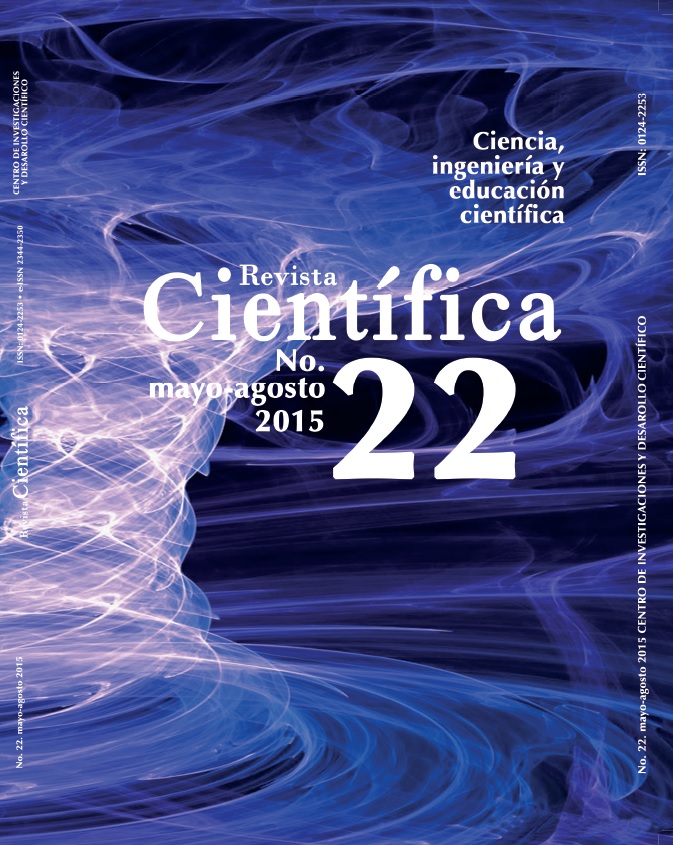DOI:
https://doi.org/10.14483/10.14483/udistrital.jour.RC.2015.22.a3Published:
10/10/2015Issue:
Vol. 22 No. 2 (2015): May-August 2015Section:
Research ArticlesAlternativas para reflexionar aspectos críticos de la ciencia en el aula
Alternatives to Reflect on Critical Aspects of Science in the Classroom
Keywords:
Ciencia crítica, Cuestiones socio-científicas, Implicaciones sociales (es).Downloads
Abstract (es)
Este artículo forma parte de una investigación sobre el uso de cuestiones socio-científicas a fin de promover las competencias para el pensamiento crítico en estudiantes universitarios. La primera parte presenta las apreciaciones de un grupo de estudiantes en formación docente acerca de la criticidad de la ciencia y lo que entienden por ciencia crítica. También, se presenta y se discute sobre las experiencias de algunos investigadores perseguidos debido a sus contribuciones científicas, ya que tuvieron implicaciones sociales, o cuestiones sociocientíficas.
Abstract (en)
This paper is part of a research about the use of scientific-social issues to promote critical thinking skills in university students. The first part presents the considerations of a group of teacher training students about the criticality of science and what they understand about critical science. It also presents and discusses the experiences of some researchers who were persecuted because of their scientific contributions with social implications or scientific social issues.
References
Acar, o.,Turkmen, l., & Roychoudhury, A. (2010). Student difficulties in socioscientific argumentation and decision-making research findings: Crossing the borders of two research lines. International Journal of Science Education, 32(9), 1191–1206.
Dawson, V.M. & Venville, G. (2010). Teaching strategies for developing students’ argumentation skills about socioscientific issues in high school genetics. Research in Science Education, 40, 133-148.
Habermas, J. (1981). The theory of communicative action. Boston: Beacon Press.
Kuhn, D. (2010). Teaching and learning science as argument. Science Education, 94(5), 810–824
Martinez, L. (2010). A abordagem de questões sociocientíficas na formação continuada de professores de ciências: contribuições e dificuldades. Tesis Doctoral. Universidade estadual paulista. Campus Universitário de Bauru.
Nuñez, J. (s.f.). La ciencia y la tecnología como procesos sociales. Lo que la educación científica no debería olvidar. Consultado el 8 de Mayo de 2013. Encontrado en
Osborrne, J. (2010). Arguing to learn in science: The role of collaborative, critical discourse. Science, 328, 463–466.
Popper, K.R. (1972). A lógica da pesquisa científica. São Paulo: Cultrix.
Segura, D. (2002). Enseñanza de la ciencia en Colombia. En Innovación y ciencia. 10, N. 3 y 4 Bogotá: ACAC.
Solbes, J. (2013). Contribución de las cuestiones socio-científicas al desarrollo del pensamiento crítico (i): introducción. Revista Eureka sobre Enseñanza y Divulgación de las Ciencias, 10(1), 1-10.
Solbes, J y Torres, N. (2013): ¿Cuáles son las concepciones de los docentes de ciencias en formación y en ejercicio sobre el pensamiento crítico? Revista Tecné, Episteme y Didaxis, 33, 61-85
Solbes, J. y Traver, M. (1996). La utilización de la historia de las ciencias en la enseñanza de la física y la química, Enseñanza de las Ciencias, 14 (1), 103-112.
Solbes, J. & Traver, M. (2003). Against a negative image of science: history of science in the physics & chemistry education, Science & Education, 12, 703-717.
Torres Merchán, N. Y. (2014). Pensamiento crítico y cuestiones socio-científicas: un estudio en escenarios de formación docente. Tesis Doctoral. Universidad de Valencia España.
Torres Merchán, N. Y., & Altuzarra, J. G. C. (2014). Las apreciaciones de la ciencia y la tecnología en estudiantes de educación no formal: contribuciones hacia su popularización. Revista Científica, (18), 67-75.
Zeidler, D.L., Sadler, T.D. & Simmons, M.L. & Howes, E.V. (2005). Beyond STS: A Research- Based Framework for Socioscientific Issues in Education. Science Education 89 (3), 357-377.
How to Cite
APA
ACM
ACS
ABNT
Chicago
Harvard
IEEE
MLA
Turabian
Vancouver
Download Citation
License
When submitting their article to the Scientific Journal, the author(s) certifies that their manuscript has not been, nor will it be, presented or published in any other scientific journal.
Within the editorial policies established for the Scientific Journal, costs are not established at any stage of the editorial process, the submission of articles, the editing, publication and subsequent downloading of the contents is free of charge, since the journal is a non-profit academic publication. profit.



